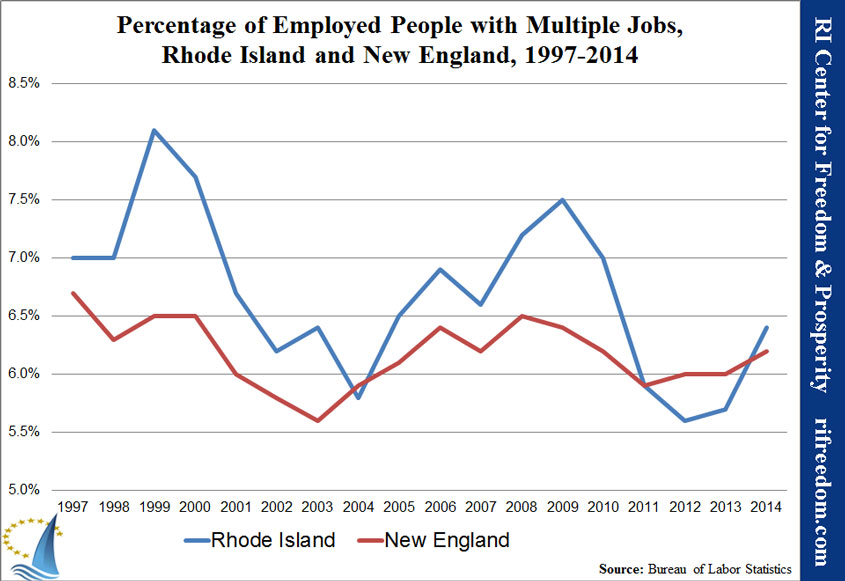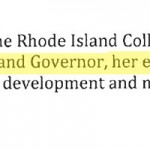Holding Multiple Jobs in RI
Earlier today, I pointed to a ZeroHedge post with an interesting chart on employment in restaurants and bars, but the point of the post to which I linked was actually to highlight national trends in workers who have multiple jobs. One reason this number is important, when tracing broad economic trends, is that the employment numbers tend to be higher than the number of jobs based in Rhode Island, and multiple-job holders should reduce that difference. That is, a person who has two RI-based jobs would count once for employment but twice for jobs in the state.
As far as I can tell, the data available from the Bureau of Labor Statistics (BLS) isn’t frequent or current enough to trace as part of a regular story of the economy. It looks like the state-level data comes out annually in August of the following year. That said, putting Rhode Island on a chart with New England overall provides food for thought. Specifically, the following chart shows the percentage of all employed people who say they have more than one job.
The first observation one can make about these trends is that Rhode Islanders tend to rely more often on multiple jobs, suggesting that the economy has long not provided sufficient opportunity for its residents to get by with one job. A second observation would be that Rhode Island spikes much more dramatically during recessions. That could mean that people with multiple jobs are, in a sense, more diversified, so they weather recessions better, while people with only a single job lose that, or it could mean recessions hurt more people, here.
The big curious question mark, though, is why the Ocean State dropped below its Rhode Island neighbors so uncharacteristically for 2012 and 2013 and then shot up the following year. One possibility is that a larger percentage of new jobs created were adequate to fulfill workers needs, in Rhode Island, which doesn’t really jibe with other observations of our job market. Alternately, people with multiple jobs might have given up on Rhode Island and exited the state’s labor force, figuring they couldn’t make it here. This could be low-end workers with low-paying jobs, or it could be contractors and people whom we might see as more entrepreneurial.
But what about that jump in 2014? Overall, for that year, we saw no spike in jobs in Rhode Island, and employment was generally higher. That is, more people were employed, but there wasn’t a surge of jobs to explain the increase of people with additional jobs. Of course, some of it could be an indication of the degree to which Rhode Island depends on the economies of neighboring states.
The worrying thing is that Rhode Island’s numbers by this measure over the past two decades has been a sort of leading indicator of national recession. We spiked in the years leading up to the dot-com bust, and we spiked again in the years leading up to the housing bubble burst.



